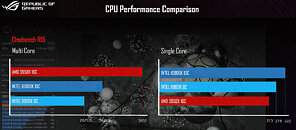- Joined
- Oct 9, 2007
- Messages
- 47,674 (7.43/day)
- Location
- Dublin, Ireland
| System Name | RBMK-1000 |
|---|---|
| Processor | AMD Ryzen 7 5700G |
| Motherboard | Gigabyte B550 AORUS Elite V2 |
| Cooling | DeepCool Gammax L240 V2 |
| Memory | 2x 16GB DDR4-3200 |
| Video Card(s) | Galax RTX 4070 Ti EX |
| Storage | Samsung 990 1TB |
| Display(s) | BenQ 1440p 60 Hz 27-inch |
| Case | Corsair Carbide 100R |
| Audio Device(s) | ASUS SupremeFX S1220A |
| Power Supply | Cooler Master MWE Gold 650W |
| Mouse | ASUS ROG Strix Impact |
| Keyboard | Gamdias Hermes E2 |
| Software | Windows 11 Pro |
Ahead of its launch a leaked ASUS ROG marketing slide reveals Cinebench R15 performance comparisons between the new Intel Core i9-10900K and AMD's current MSDT flagship part, the Ryzen 9 3950X. The graphs also include Intel's previous gen flagship, the i9-9900K, which should provide a reasonable indication of where the new Core i7-10700K performance could land.
In the single-threaded Cinebench R15 test, the Core i9-10900K scores 222 points, while the 3950X scores 213, which is a 4.22% lead for the new Intel flagship over AMD's. The i9-9900K is 2.81% faster than the 3950X in the same test. The landscape changes completely with multi-thread. Armed with 16 cores and 32 threads, the 3950X tests 48.61% faster than the i9-10900K, and a whopping 94.14% faster than the i9-9900K, which means the 3950X should land around 90% (±5%) faster than the i7-10700K. Core i9-10900K vs. Ryzen 9 3900X should make for a fascinating contest.

View at TechPowerUp Main Site
In the single-threaded Cinebench R15 test, the Core i9-10900K scores 222 points, while the 3950X scores 213, which is a 4.22% lead for the new Intel flagship over AMD's. The i9-9900K is 2.81% faster than the 3950X in the same test. The landscape changes completely with multi-thread. Armed with 16 cores and 32 threads, the 3950X tests 48.61% faster than the i9-10900K, and a whopping 94.14% faster than the i9-9900K, which means the 3950X should land around 90% (±5%) faster than the i7-10700K. Core i9-10900K vs. Ryzen 9 3900X should make for a fascinating contest.

View at TechPowerUp Main Site








 (yeah i know ... that's a lot of X ... not a X rated i hope ... )
(yeah i know ... that's a lot of X ... not a X rated i hope ... )